Public Outreach
The Archaeology Institute presents public talks and offers tours of excavation sites.
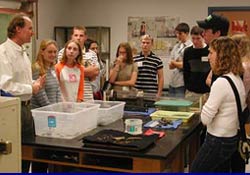
In addition to including members of the general public in projects, classes and events, UWF archaeologists regularly present public talks at no cost to schools, teacher workshops and organizations such as Rotary, Sertoma, Elderhostel, and garden clubs. UWF archaeological investigations are often conducted in publicly accessible places. Where possible, information tables are available to the public. Students and staff are always willing to discuss the excavations with visitors, and tours are available upon request. When sites are not generally accessible, as is often the case with maritime excavations, special tours or public archaeology days are arranged to bring guests to the sites.
For more information about requesting a presentation or tour, call the Archaeology Institute at (850) 474-3015.
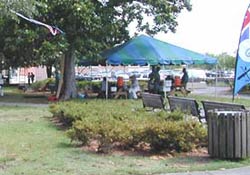
Public information tables during excavations in Ferdinand Plaza, downtown Pensacola.
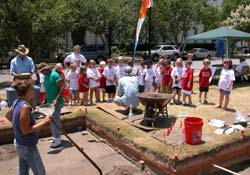
Students enjoy a tour of the Commanding Officer's Compound excavation in downtown Pensacola.
Unearthing Pensacola and Unearthing Florida

From 1998 to 2012, one of the most popular local media presentations of archaeology was the radio program "Unearthing Pensacola" on National Public Radio station WUWF 88.1 FM. Narrated by Dr. Judy Bense, an archaeologist and now UWF's President, this daily feature provided a one-minute overview of the many archaeological sites in the Pensacola area. In 2007, the Archaeology Institute published a coffee table book, Unearthing Pensacola, by Dr. Bense based on this series. The book can be purchased through the Institute by calling (850) 474-3015. The latest incarnation of the series is "Unearthing Florida", still voiced by Dr. Bense on the air at WUWF.
Media Exposure
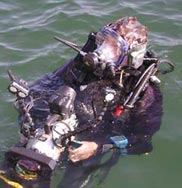
In the mid-1980s, a few years after the UWF Anthropology program and Archaeology Institute were formed, the oldest historic portion of downtown Pensacola was involved in a program of urban renewal. Pavement was removed from streets and utilities were replaced. These activities exposed archeological deposits dating from the 1750s through the Civil War, including pristine colonial and early American features that had been preserved beneath old pavement and sidewalks. Construction workers were removing the archaeological materials with machines and hauling them off for landfill. Even worse, collectors were actively involved in looting the disturbed sites and selling the artifacts. Realizing that civic leaders and the public were completely unaware of the irreplaceable archaeological remains in their midst, Dr. Judy Bense organized a long-term public information campaign. A local support group, the Pensacola Archaeological Society, was organized to assist in public outreach efforts. The City of Pensacola passed an archaeological review policy and the media was encouraged to share archaeological finds and activities with the public.
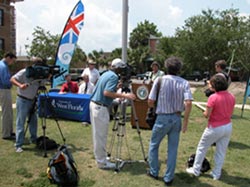
Since that first press conference in 1984, UWF archaeology has benefited from a steady stream of media coverage at the local, national and international level. UWF archaeology has been on national news many times, including Good Morning America for the Colonial Archaeological Trail project, Fox FX for live underwater shipwreck coverage, Associated Press Radio live for the raising of the 1559 Luna ship anchor, and inclusion in a History Channel documentary on shipwrecks. The consistent coverage has educated the public that there IS archaeology in Pensacola and that it is beneficial for the community. Thanks to the media, Pensacola archaeology is now on the map.
UWF's anthropologists also reach out to the public through an increasing presence on social media. Our faculty and students write blogs about field school, post about academic life, and encourage participation on Facebook sites dedicated to archaeology in Pensacola. For more information, see .



